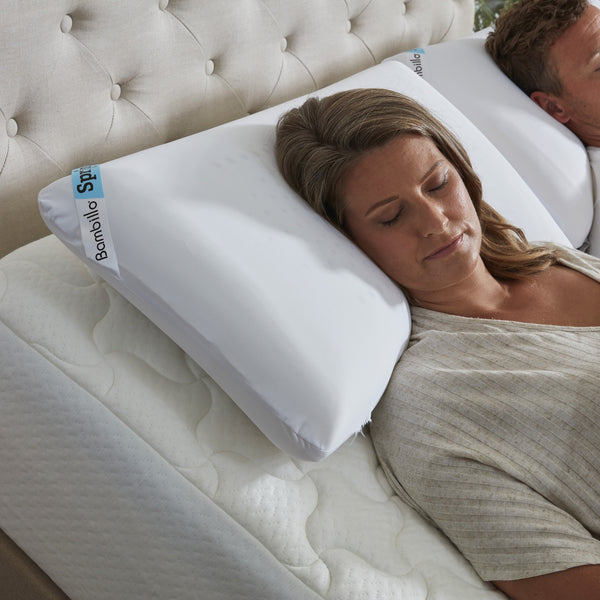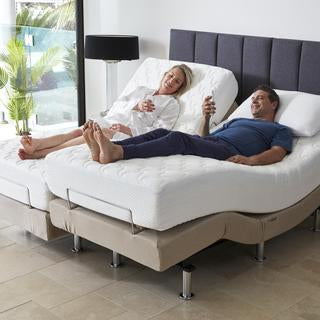Snoring is an annoying issue that can place strain on couples. Sleep apnoea is a more severe type of snoring where breathing can stop multiple times during the night. Both afflictions affect millions of people worldwide. Men are more likely to snore than women because they have narrower air passages. Snoring tends to get worse with age, as muscle tone deteriorates.
Causes:
• The shape of your mouth can cause snoring, particularly the length of the uvula (piece of tissue that hangs down from the roof of the mouth at the back), large tonsils or adenoids.
• The shape of your nose, especially the nasal septum or partition between the nostrils, can influence snoring. Nasal congestion is another culprit.
• Being overweight can result in extra tissues in the back of the throat which narrow the airways, increasing the likelihood of snoring.
• Alcohol or drug intake can be risk factors, relaxing throat muscles. Drugs likely to cause snoring include sedatives and sleeping pills.
• Smoking creates irritation in the nose and throat which can constrict the airways.
• Sleep position when you lie on your back, you’re more likely to snore as the airway narrows in this position.
Causes:
• The shape of your mouth can cause snoring, particularly the length of the uvula (piece of tissue that hangs down from the roof of the mouth at the back), large tonsils or adenoids.
• The shape of your nose, especially the nasal septum or partition between the nostrils, can influence snoring. Nasal congestion is another culprit.
• Being overweight can result in extra tissues in the back of the throat which narrow the airways, increasing the likelihood of snoring.
• Alcohol or drug intake can be risk factors, relaxing throat muscles. Drugs likely to cause snoring include sedatives and sleeping pills.
• Smoking creates irritation in the nose and throat which can constrict the airways.
• Sleep position when you lie on your back, you’re more likely to snore as the airway narrows in this position.
Obstructive sleep apnoea results in decreased oxygen in the blood during sleep, which can cause daytime sleepiness, headaches, irritability and moodiness. Serious consequences include a greater risk of high blood pressure, heart disease and stroke.
Solutions:
• Get a professional evaluation of your mouth anatomy. If you’re snoring due to a structural abnormality, there may be surgical options to consider such as uvulopalatopharyngoplasty (UPPP), thermal ablation palatoplasty (TAP), somnoplasty, palatal implants, adenoidectomy or tonsillectomy.
• Lose weight. A reduction in fatty tissues in the throat may end snoring.
• Exercise. Working the muscles in your legs, arms and abdominal region helps to tone throat muscles, reducing snoring.
• Quit smoking. It will benefit your general health and may fix your snoring, too.
• Banish back sleeping. Sew a sock into the back of your pyjama top, and put a tennis ball inside. This will discourage back sleeping until a habit of side sleeping is formed.
• Continuous Positive Airway Pressure (CPAP). This device is essentially a mask fitted over your nose and mouth that keeps the airways open with a steady stream of pressurised air. It’s effective for snoring and sleep apnoea.
• Get a professional evaluation of your mouth anatomy. If you’re snoring due to a structural abnormality, there may be surgical options to consider such as uvulopalatopharyngoplasty (UPPP), thermal ablation palatoplasty (TAP), somnoplasty, palatal implants, adenoidectomy or tonsillectomy.
• Lose weight. A reduction in fatty tissues in the throat may end snoring.
• Exercise. Working the muscles in your legs, arms and abdominal region helps to tone throat muscles, reducing snoring.
• Quit smoking. It will benefit your general health and may fix your snoring, too.
• Banish back sleeping. Sew a sock into the back of your pyjama top, and put a tennis ball inside. This will discourage back sleeping until a habit of side sleeping is formed.
• Continuous Positive Airway Pressure (CPAP). This device is essentially a mask fitted over your nose and mouth that keeps the airways open with a steady stream of pressurised air. It’s effective for snoring and sleep apnoea.
Facts:
• Approximately ¼ of people are snorers
• In a divorce case in Iran, a woman admitted drugging her husband early in the marriage so he wouldn’t hear her snoring
• 70% of snorers have family members who also snore
• Snoring sounds can range from 50 decibels right up to 100 decibels, which is the equivalent of a pneumatic drill
• The louder you snore, the more likely you are to be overweight
• People who snore frequently are 5 times more likely to develop heart disease, stroke, high blood pressure, high cholesterol or type 2 diabetes
• Snorers have a 3 times greater risk of developing general health problems than people who don’t snore
• One in three couples report tension in their relationship due to snoring
• Approximately ¼ of people are snorers
• In a divorce case in Iran, a woman admitted drugging her husband early in the marriage so he wouldn’t hear her snoring
• 70% of snorers have family members who also snore
• Snoring sounds can range from 50 decibels right up to 100 decibels, which is the equivalent of a pneumatic drill
• The louder you snore, the more likely you are to be overweight
• People who snore frequently are 5 times more likely to develop heart disease, stroke, high blood pressure, high cholesterol or type 2 diabetes
• Snorers have a 3 times greater risk of developing general health problems than people who don’t snore
• One in three couples report tension in their relationship due to snoring



